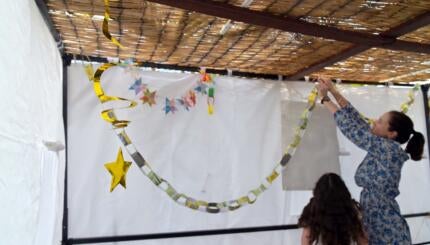The king of Moav has heard about the Israelites. Their reputation precedes them. He knows they cannot be defeated with the sword alone. He has heard that God is on their side. To win, he will need to use the same power against them. Prophecy must be fought with prophecy. So he sets out to hire the prophet Balaam.
What is so baffling about this story is that Balaam is not a false prophet. God actually speaks to Balaam, which raises an obvious problem: Why? Why does God talk to our enemy? Why does he have the power of prophecy too? If God has our backs, then why would God speak to Balaam at all?
One way to resolve this problem is by claiming that Balaam isn’t actually so bad. Maybe there are decent people on both sides. But the rabbis reject this outright, bringing several teachings in the Talmud to illustrate that Balaam is truly evil. He is said to have been so bad that he was one of just four people who have no place in the World to Come. We are told that it was Balaam who advised Pharaoh to kill all the baby boys in Egypt and that he is guilty of bestiality. Balaam is not just bad, he’s the worst.
We tend to like this kind of clarity. We are good and our enemies are bad. We are nothing like them. But amidst these stories of Balaam’s evil ways, we find an unexpected passage in Tractate Sanhedrin in which Balaam is compared to none other than the patriarch Abraham. The comparison is rooted in the fact that the Torah uses almost identical language to describe the actions of both men.
With your help, My Jewish Learning can provide endless opportunities for learning, connection and discovery.
It was taught in the name of Rabbi Shimon ben Elazar: Love negates stature we learn from Abraham, as it is written: “And Abraham rose early in the morning and saddled his donkey” (Genesis 22:3). Hatred negates stature we learn from Balaam, as it is written: “And Balaam rose early in the morning and saddled his donkey” (Numbers 22:21).
Both men rose early and saddled a donkey, and yet the Talmud learns from them opposite lessons. Abraham was so overcome with love for God and the holy task he was given that he saddled his donkey by himself rather than wait for his servants to do the manual labor. His love for God overcame his need for honor. Balaam exhibits the same behavior, but we learn from him the exact opposite: His hatred was so deep that it overcame his need for honor.
This text is way too close for comfort. How can we be sure that Abraham is love and Balaam is hate? How can we read the same verse in both stories and feel certain that their motives are opposites? That sinking feeling only deepens when we realize that the verse about Abraham is from the story of the binding of Isaac. Abraham is following God’s word to kill his own son. The action he plans to take is so deeply problematic that it’s impossible to look at it with pride.
The Talmud seeks to create a clear distinction between the men, but that’s not how the real world looks, and the rabbis know that too. Rabbi Shimon ben Elazar asserts the difference by citing verses that look most similar, as if to say: You might get confused. Without this teaching, you might mistake Balaam and Abraham for parallel prophets. Don’t make that mistake.
This reading helps us better understand all the talmudic texts that disparage Balaam. Perhaps the rabbis go out of their way to vilify Balaam not because he is so obviously bad, but because his sins might not otherwise be obvious. Right and wrong do sometimes look similar, but that doesn’t mean they are. There is a difference between good and bad, and that difference matters. In this case, the difference is motivation. We can wake up in the morning motivated by hate, like Balaam. Or we can wake up in the morning motivated by love, like Abraham.
This particular moment in history is a confusing time. Some days we think we see good and bad as polar opposites, where we and our enemies have nothing at all in common, when we cannot imagine that God might be speaking to a prophet on their side. In other moments, the picture blurs and it can start to look like all the sides are the same — going through the same motions, saddling their donkeys and speaking for God.
What can we do? We might start by focusing on intentions. Like Abraham, we can strive to be motivated by love. And like Balaam, we can try to open ourselves up to real divine revelation, and hope that in the end we will find our way towards a blessing.
This article initially appeared in My Jewish Learning’s Shabbat newsletter Recharge on July 20, 2024. To sign up to receive Recharge each week in your inbox, click here.



